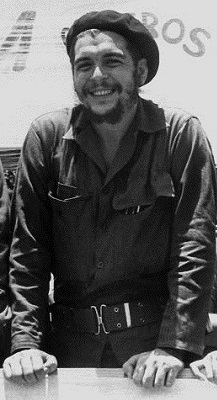|
~ Ernesto Che Guevara
~ Galéria
~ Oldal
~ Bejelentkezés
~ Vissza a Főoldalra
Ernesto Che Guevara, az argentin származású forradalmár, miniszter, gerillavezér és író, Buenos Aires-ben szerzett orvosi diplomát, majd a kubai forradalom során jelentős szerepet játszott a szigetország felszabadításában és újjáépítésében. A kubai gazdaság talpraállításáért dolgozott, küzdött az oktatás és az egészségügy fejlesztéséért, az írástudatlanság és a faji előítéletek felszámolásáért. Saját példájával népszerűsítette az önkéntes munkát. Kongóban és Bolíviában is harcolt - harminckilenc éves volt, amikor az amerikai-bolíviai csapatok csapdába ejtették és kivégezték.
| | |
|

| | |
|
|

Che Guevara Museo, Alta Gracia
The house, where the young Che lived with his family in his childhood in Alta Gracia (Córdoba, Argentina) in the 1930s, has been converted into a museum in 2001. Even Fidel Castro visited it in 2006 (you can find a photo of this event in the Alta Gracia section in the Gallery.)
The house contains the original furniture, Che's personal items, family photos, his books, handwritten-letters, his bicycle and even a replica of the famous La Poderosa II, the motorcycle by which he and Alberto Granado took their journey in South America.
Address: Avellaneda 501
Telephone number: +54 03547-428579
Open: from 9 a.m. to 8 p.m. every day
Price: 75 Argentine pesos for non-Argentinian people; 15 Argentinian pesos for Argentinian people (2013)
You can check out the 33 photos taken of the museum - inside and outside:
[Gallery: Che Guevara Museo, Alta Gracia]
Video about the museum:
|
|
|
|
~ Ernesto Che Guevara
~ Gallery
~ Site
~ Log in
~ Back to the Main page
Ernesto Che Guevara, the Argentine-born revolutionary, minister, guerrilla leader and writer, received his medical degree in Buenos Aires, then played an essential part in the Cuban Revolution in liberating and rebuilding the country. He did his best to set up the Cuban economy, fought for the improvement of the education and the health system, the elimination of illiteracy and racial prejudice. He promoted voluntary work by his own example. He fought in the Congo and in Bolivia - he was thirty-nine years old, when he was trapped and executed by the joint American-Bolivian forces.
| | |
|
|

